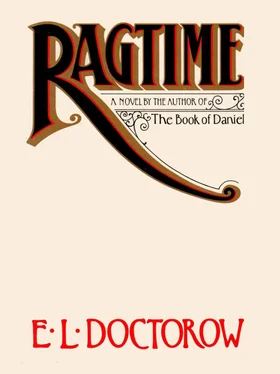Edgar Doctorow - Ragtime
Здесь есть возможность читать онлайн «Edgar Doctorow - Ragtime» весь текст электронной книги совершенно бесплатно (целиком полную версию без сокращений). В некоторых случаях можно слушать аудио, скачать через торрент в формате fb2 и присутствует краткое содержание. Жанр: Современная проза, на английском языке. Описание произведения, (предисловие) а так же отзывы посетителей доступны на портале библиотеки ЛибКат.
- Название:Ragtime
- Автор:
- Жанр:
- Год:неизвестен
- ISBN:нет данных
- Рейтинг книги:4 / 5. Голосов: 1
-
Избранное:Добавить в избранное
- Отзывы:
-
Ваша оценка:
- 80
- 1
- 2
- 3
- 4
- 5
Ragtime: краткое содержание, описание и аннотация
Предлагаем к чтению аннотацию, описание, краткое содержание или предисловие (зависит от того, что написал сам автор книги «Ragtime»). Если вы не нашли необходимую информацию о книге — напишите в комментариях, мы постараемся отыскать её.
Ragtime — читать онлайн бесплатно полную книгу (весь текст) целиком
Ниже представлен текст книги, разбитый по страницам. Система сохранения места последней прочитанной страницы, позволяет с удобством читать онлайн бесплатно книгу «Ragtime», без необходимости каждый раз заново искать на чём Вы остановились. Поставьте закладку, и сможете в любой момент перейти на страницу, на которой закончили чтение.
Интервал:
Закладка:
By this time, however, the course of events could not be changed. In the late winter Sarah said she would see Coalhouse Walker in the parlor. For days there was a flurry of preparation. Mother gave her one of her own dresses and helped her to take it in. She came downstairs, beautiful ad shy. Her hair was comb and pomaded and she sat on the sofa with her eyes lowered as Coalhouse Walker Jr. spoke his formal conversation and played the piano for her. It was only when they were seen together that it became apparent he was a good deal older than she was. Mother insisted that the members of the family excuse themselves so that the courtship could go on in privacy. Nothing was speeded by this. After the visit Sarah looked irritated and even angry. She was slow to forgive, and in some peculiar way her stubbornness seemed the only appropriate response to his persistence. Sarah had attempted to kill her newborn child. Life was not something either of these people took carelessly. They lived in brutal subjection to their hopes and feelings. They suffered themselves. Mother’s Younger Brother understood this perhaps more clearly than anyone in the family. He had spoken to Coalhouse Walker just once but admired him immensely. He saw in the way the black man acted upon his intentions more manhood than he himself possessed. He brooded over this. Younger Brother understood the love in some hearts as a physical tenderness in that part of the body, a flaw in the physiological being equivalent to rickets of the bones or a disposition of the lungs to congest. He was afflicted with this and so was Sarah, colored though she was. He thought she was some displaced African queen; her very awkwardness as she moved suggested that it would be grace in another country. And the more reluctant she seemed to accept Coalhouse Walker’s offer of marriage, the more Younger Brother understood what a terribly afflicted heart she had.
But one Sunday in March, with the wind blowing softer and small brown buds visible on the branches of the maple trees, Coalhouse arrived in his shining Ford and left the motor idling. Neighbors in their yards came out to watch the strange intense black man, burly and correct, with his dark, dark eyes on the verge of crossing, and the beautiful awkward Sarah, wearing a pink shirtwaist and a black skirt and jacket and one of Mother’s wide-brimmed hats, as they walked under the Norwegian maples and down the concrete steps to the street. She carried her baby. He helped her into the car and got up behind the wheel. They waved to the family and rove off through the suburban streets to the farmlands at the north end of town. They parked at the side of the road. They watched a cardinal skim the hard brown earth, then beat its way to the highest thinnest branch of a tree. This was the day he asked her to marry and she accepted. The appearance of these magnificent lovers in the family’s life had been startling, the conflict of their wills had exercised an almost hypnotic effect.
22
And now Mother’s Younger Brother began again his trips to New York. He would work at his drawing table past the dinner hour and then catch an evening train. He had made friends of some ordnance officers on duty at the armory on Lexington Avenue and 34th Street. They complained about the Springfield rifle. They showed him their small arms and their grenade bombs. He knew immediately that he could design better weapons. He drank with the officers. He became known at the stage doors of several Broadway theatres. He stood in the alleys, like others, never so well-groomed as some of the older men, nor so carelessly handsome as the collegians from Princeton or Yale. But there was an intensity of expectation about his eyes that attracted a fair number of women. He was always so serious and unhappy that they were persuaded he loved then. They took him for a poet.
Still, his salary couldn’t support these tasted. Broadway was alive with lights and entertainment and everyone connected with the theatre and charged by its excitement lived to the limit. He learned where to find women who would go to bed with him for a modest price. One of these places was the Bethesda Fountain in Central Park. They walked in twos whenever the weather was mild. The days were beginning to lengthen. In cold luxurious sunsets they strolled about the fountain, shadows filling the great steps, the water already black, the paving stones brown and pink. He amused them by taking them seriously. He was gentle with them and they didn’t mind his oddity because it was gentle. He would take a woman to his hotel room and then sit in a chair with one show in his hand and completely forget about her. Or he would not attempt to make love but only inspect her intimate places. He drank wine until he was insensible. He dined in steakhouses with sawdust on the floor. He went to cellar clubs in Hell’s Kitchens where hoodlums bought everyone drinks. He walked Manhattan at night, his eyes devouring passers-by. He stared in the windows of restaurants and sat in hotel lobbies, his restless eyes picking out motion and color before it defined itself.
Eventually he found the offices of the Mother Earth magazine published by Emma Goldman. They were on 13th Street in a brownstone that served now as the anarchist’s residence when she was in New York. He stood in the street under the lamppost and stared at the windows. He did this for several nights. Finally a man came out of the door, walked down the steps and crossed the street to where he stood. He was a tall cadaverous man, with long hair and a string tie. He said It gets cold in the evenings — come in, we have no secrets. And Younger Brother was led across the street and up the steps.
It turned out that in his vigil he had been mistaken for a police spy. He was treated with elaborate irony. He was offered tea. Numbers of people were standing about in the apartment in their hats and coats. Then Goldman appeared in a doorway and her attention was directed to him. Good God, she said. That’s no policeman. She began to laugh. She was putting on a hat and setting it in place with hatpins. He was thrilled that she remembered him. Come with us, she called.
A while later Younger Brother found himself in the Cooper Union down near the Bowery. The hall was hot, crowded to overflowing. There were lots of foreigners. Men wore their derbies though indoors. It was a great stinking congress garlicked and perfumed in its own perspiration. It had met in support of the Mexican Revolution. He hadn’t known there was a Mexican Revolution. Men waved their fists. They stood on benches. Speaker after speaker arose. Some spoke in languages other than English. They were not translated. He had trouble hearing. What seemed to have happened was that the Mexican peons had spontaneously revolted against Díaz the President of Mexico for the past thirty-five years. They needed guns. They needed ammunition. They were striking from the hills, attacking the Federals and the supply trains with wooden staves and muzzle-loading muskets. He thought about this. Finally Emma Goldman got up to speak. Of all the orators she was the best. The hall went quiet as she described the complicity of the wealthy landowners and the despised tyrant Díaz, the subjugation of the peons, the poverty and starvation and, most shameful of all, the presence of representatives of American business firms in the national counsels of the Mexican government. Her voice was strong. As she moved her head and gesticulated the light flashed from her glasses. He pushed his way forward to be closer to her. She described one Emiliano Zapata, a simple farmer of the Morelos district who had turned revolutionary because he had no choice. He wore the share farmer’s bleached pajama coat and trousers, bound over the chest with bandoleers and belted with a cartridge belt. My comrades, she cried, that is not a foreign costume. There are no foreign lands. There is no Mexican peasant, there is no dictator Díaz. There is only one struggle throughout the world, there is only the flame of freedom trying to light the hideous darkness of life on earth. The applause was deafening. Younger Brother had no money. He turned out his pockets, mortified to see all around him people who reeked of their poverty coming up with handfuls of change. He found himself standing at the foot of the speaker’s platform. The speeches were done, she stood surrounded by colleagues and admires. He saw her hug a swarthy man who wore a dark suit and tie but also an enormous sombrero. She turned and her glance fell on the balding blondish young man whose head came just above the platform stage, as if severed like a French republican’s, the eyes turned upward in a kind of ecstasy. She laughed.
Читать дальшеИнтервал:
Закладка:
Похожие книги на «Ragtime»
Представляем Вашему вниманию похожие книги на «Ragtime» списком для выбора. Мы отобрали схожую по названию и смыслу литературу в надежде предоставить читателям больше вариантов отыскать новые, интересные, ещё непрочитанные произведения.
Обсуждение, отзывы о книге «Ragtime» и просто собственные мнения читателей. Оставьте ваши комментарии, напишите, что Вы думаете о произведении, его смысле или главных героях. Укажите что конкретно понравилось, а что нет, и почему Вы так считаете.












